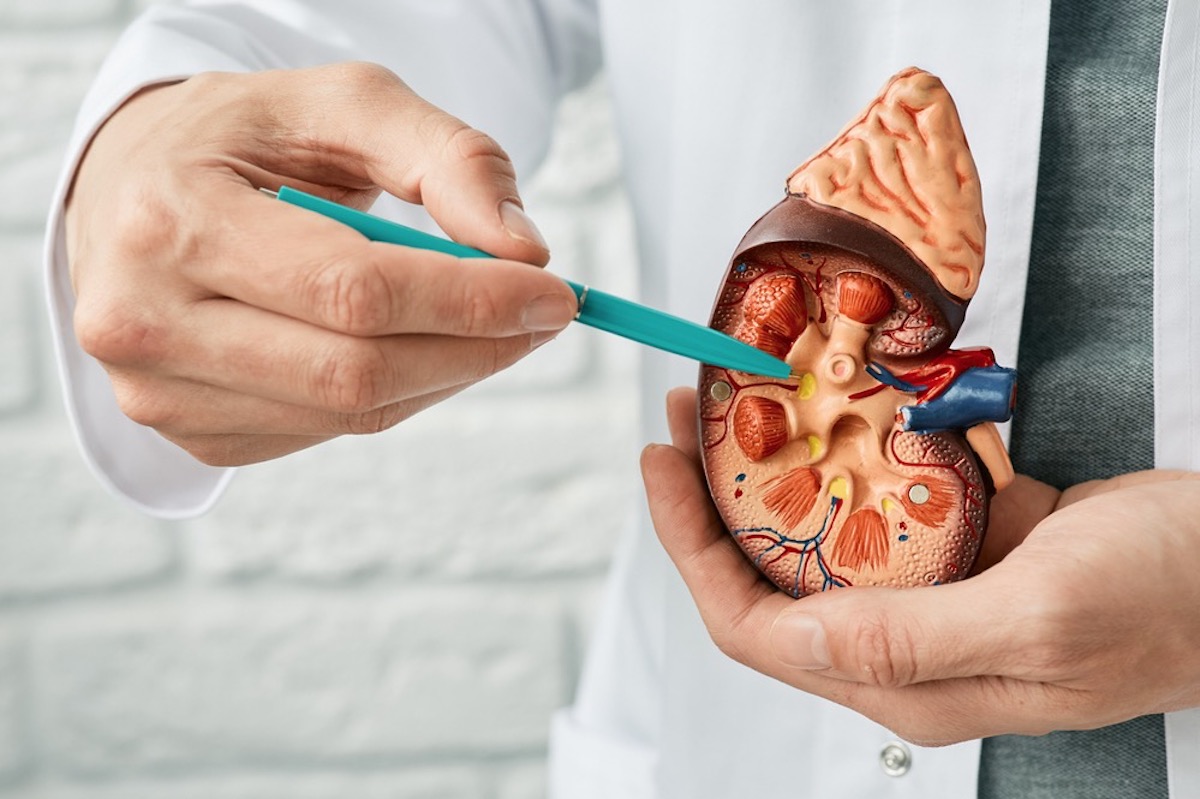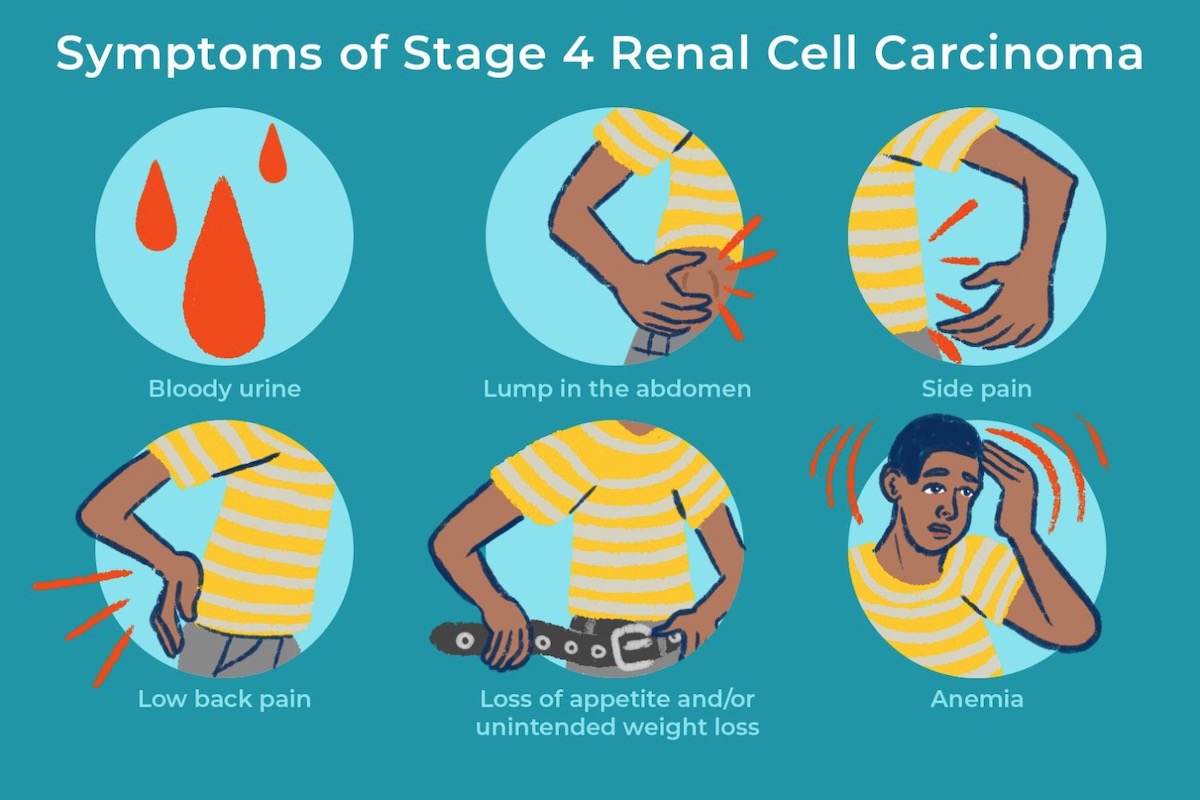Renal cancer, also known as kidney cancer, is a serious health condition where cancer cells grow uncontrollably in the kidneys, the organs responsible for filtering waste from the blood and making urine. This type of cancer can have a significant impact on a person’s health. Kidney cancer is one of the ten most common cancers in the United States. Every year, about 79,000 Americans are diagnosed with this disease. This makes it important for everyone to know how you can recognize the (early) warning signs.

Types & Causes of Renal Cancer
There are several different types of renal cancer, with each type starting in different cells of the kidney. The most common type is called renal cell carcinoma (RCC), which accounts for about 90% of all kidney cancers. RCC usually begins in the lining of the tiny tubes inside your kidneys. Another type, called transitional cell carcinoma, starts in the cells that line the renal pelvis, where urine goes before it moves to the bladder. There’s also a rare type known as Wilms tumor, which mostly affects children.
The exact causes of renal cancer aren’t fully understood, but several risk factors have been identified. These include smoking, obesity, high blood pressure, and having certain genetic conditions. Essentially, these factors may lead to changes in the DNA of the kidney cells, causing them to grow uncontrollably and form a tumor.
Stages & Survival Rate of Kidney Cancer
Kidney cancer, like other cancers, is classified into stages. These stages describe the size of the cancer and how far it has spread. Staging is crucial because it helps determine the best approach for treatment and gives an idea about the outlook for recovery. In this table, you’ll learn the different stages of renal cancer and their estimated survival rates. Survival rates are typically given as a percentage, indicating the proportion of people who survive the disease for a specified period (usually 5 years) after their diagnosis compared to the general population.
Stages & Survival Rates Table
| Stage | Substage | Description | 5-Year Survival Rate (%) |
|---|---|---|---|
| I | IA | Tumor is 4 cm or smaller, confined to the kidney. | 90-95 |
| I | IB | Tumor is larger than 4 cm but no larger than 7 cm, confined to the kidney. | 90-95 |
| II | IIA | Tumor is larger than 7 cm but still confined to the kidney. | 80-85 |
| II | IIB | Tumor is larger, and may be growing into major veins or perinephric tissues, but not beyond the Gerota's fascia. | 80-85 |
| III | IIIA | Cancer has spread to nearby lymph nodes, or the tumor has invaded the renal vein or its segments. | 50-60 |
| III | IIIB | Cancer has spread to nearby major veins or perinephric tissues but is still contained within the Gerota's fascia. | 50-60 |
| III | IIIC | Cancer has spread to nearby lymph nodes and either major veins or perinephric tissues. | 40-50 |
Certain factors increase the likelihood of developing renal cancer. People over the age of 60 are more likely to be diagnosed with this condition. Smoking also raises the risk, which can decrease after quitting but takes many years to return to the level of non-smokers. Being overweight affects hormones in ways that may lead to kidney cancer, and high blood pressure is another risk factor. A family history of kidney cancer can increase risk, possibly due to genetic factors.

Long-term use of some pain medications and exposure to specific workplace substances like asbestos and certain chemicals can also heighten the risk. Additionally, those with advanced kidney disease, especially those requiring dialysis, are at a higher risk. While these factors do not guarantee one will develop kidney cancer, they do increase the chances compared to individuals without these factors.
Symptoms of Renal Cancer
Renal cancer often doesn’t cause noticeable symptoms in its early stages. However, as the disease progresses, symptoms can become more apparent. The two most common symptoms of renal cancer are blood in the urine, which may make the urine look pink, red, or cola-colored, and a lump or mass that can be felt in the side or abdomen. Other common symptoms include:
- Persistent pain in the side or lower back that doesn’t go away;
- Loss of appetite;
- Unintended weight loss;
- Anemia, which can make you feel tired and weak.
These symptoms can vary and are sometimes caused by other, less serious conditions. If you experience any of these symptoms, it’s important to see a healthcare provider for further evaluation.
Diagnosis & Treatment Options
Renal cancer, or kidney cancer, is diagnosed using several methods. Initially, doctors might perform imaging tests such as ultrasounds, CT scans, or MRIs, which can help see the kidney in detail and identify any tumors. A biopsy, where a small sample of kidney tissue is taken and examined under a microscope, may also be used to confirm the presence of cancer cells.
Treatment for renal cancer depends on the stage of the cancer, the patient’s overall health, and other factors. The two most common treatment options are surgery and targeted therapy. Surgery involves removing the cancerous part of the kidney or the entire kidney if necessary. Targeted therapy uses drugs to specifically attack cancer cells without harming normal cells.
Other common treatment options include:
- Radiation therapy, which uses high-energy rays to target and kill cancer cells;
- Immunotherapy, which helps the immune system recognize and destroy cancer cells;
- Cryotherapy, which freezes and kills cancer cells;
- Radiofrequency ablation, which uses heat to destroy cancer cells.
The choice of treatment depends on the stage of the cancer, the patient’s overall health, and other factors. These days, medical professionals have various ways to treat cancer, including the options mentioned above. Sometimes, doctors combine these treatments, but there may be cases where they are no longer effective, prompting consideration of other options. To stay informed about new treatments, it is crucial to conduct extensive online research. If you are diagnosed with renal cancer and unsatisfied with your treatment plan, seeking a second opinion from another hospital or oncology center is always a wise decision. Keep exploring to learn more about cancer, the stages of kidney cancer, and its treatment options. Continue your search here:

